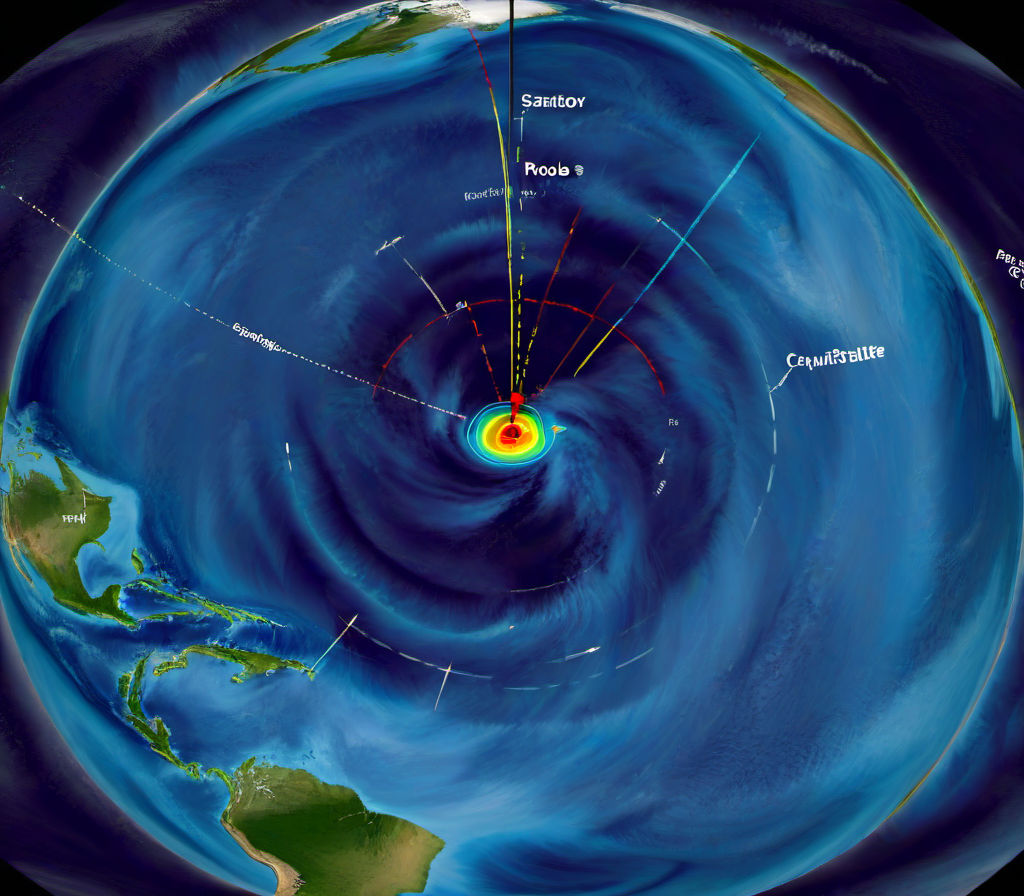This post was generated by an LLM
Listen
The difference in effective gravity between the equator and the poles is a result of two primary factors: the Earth’s oblateness (equatorial bulge) and the centrifugal force caused by its rotation. These factors combine to produce a measurable variation in gravitational acceleration, with effective gravity being stronger at the poles and weaker at the equator. Below is a detailed breakdown of the technical aspects and calculations involved:
1. Earth’s Oblateness and Distance from the Center
The Earth is not a perfect sphere but an oblate spheroid, meaning it bulges at the equator and is flattened at the poles. This shape results in the equator being approximately 21 km (13 mi) farther from the Earth’s center than the poles [1].
Gravitational acceleration is inversely proportional to the square of the distance from the center of mass ($ g = \frac{GM}{R^2} $), where $ G $ is the gravitational constant, $ M $ is Earth’s mass, and $ R $ is the distance from the center. Since the equator is farther from the center, the gravitational acceleration is inherently weaker there compared to the poles. This effect alone accounts for a ~0.18% reduction in gravity at the equator relative to the poles [3].
2. Centrifugal Force from Earth’s Rotation
The Earth’s rotation introduces a centrifugal force that acts outward at the equator, counteracting gravity. This force is zero at the poles and maximum at the equator. The centrifugal acceleration ($ a_c $) is given by:
$$ a_c = \omega^2 R $$
where $ \omega $ is the angular velocity of Earth’s rotation ($ \approx 7.292 \times 10^{-5} \, \text{rad/s} $) and $ R $ is the equatorial radius ($ \approx 6.378 \times 10^6 \, \text{m} $). For a 1 kg mass at the equator, this results in a centrifugal force of approximately 0.0337 m/s² [8]. This further reduces the effective gravity at the equator by about 0.034% [10].
3. Combined Effect on Effective Gravity
When both factors are considered, the total difference in effective gravity between the equator and the poles is approximately 0.3% [4]. For example, a person weighing 100 kg at the poles would weigh about 99.7 kg at the equator [4]. This discrepancy arises because:
- The equatorial bulge reduces gravity by ~0.18% due to increased distance from Earth’s center.
- The centrifugal force reduces gravity by an additional ~0.034% at the equator [8].
4. Measured Values and Variations
- Polar gravity: ~9.832 m/s² [14].
- Equatorial gravity: ~9.780 m/s² [14].
- Difference: ~0.052 m/s², which corresponds to the 0.3% variation mentioned in multiple sources [4][10].
This variation is not uniform across the globe due to local geological density variations, but the equator-pole difference remains a consistent and measurable phenomenon [13].
5. Practical Implications
The difference in effective gravity has practical implications:
- Satellite orbits: Satellites require adjustments in orbital parameters to account for Earth’s oblateness and rotational effects.
- Precision measurements: High-accuracy experiments (e.g., in geodesy or physics) must account for these variations to avoid errors [13].
- Human perception: While the difference is too small to feel directly, it affects the weight of objects and the calibration of instruments like gravimeters [7].
Conclusion
The effective gravity at the equator is ~0.3% less than at the poles due to the combined effects of Earth’s oblateness and centrifugal force. This variation, though small, is significant in scientific and engineering contexts, highlighting the interplay between Earth’s shape, rotation, and gravitational physics. Understanding these nuances is critical for fields ranging from space exploration to geophysics.
https://en.wikipedia.org/wiki/Equatorial_bulge
https://www.quora.com/Why-is-gravity-at-the-pole-greater-than-the-equator
https://van.physics.illinois.edu/ask/listing/64061
https://www.researchgate.net/post/Is_acceleration_due_to_gravity_at_poles_less_than_that_at_equator_and_why_does_gravity_decrease_from_equator_to_pole
https://www.quora.com/Is-the-gravity-at-the-poles-any-weaker-than-at-the-equator
https://ui.adsabs.harvard.edu/abs/1978AmJPh..46..790I/abstract
https://www.wtamu.edu/~cbaird/sq/2014/01/07/do-i-weigh-less-on-the-equator-than-at-the-north-pole/
https://www.physicsforums.com/threads/gravitational-field-strength-at-the-equator-and-poles.993626/
https://physics.stackexchange.com/questions/141856/why-is-earths-gravity-stronger-at-the-poles
https://www.quora.com/What-is-the-difference-in-weight-of-a-body-between-the-poles-and-the-equator
Why is gravity weaker at the equator?
https://www.physicsforums.com/threads/gravity-at-earths-poles-vs-equator.1065794/
https://pburnley.faculty.unlv.edu/GEOL452_652/gravity/notes/GravityNotes18LatitudeVariations.htm
https://physics.stackexchange.com/questions/828486/does-moving-from-the-equator-to-a-pole-require-more-or-less-energy-work-than-m
https://www.teachoo.com/10249/3060/Why-is-gravity-maximum-at-poles-and-minimum-at-equator-/category/Extra-Questions/
This post has been uploaded to share ideas an explanations to questions I might have, relating to no specific topics in particular. It may not be factually accurate and I may not endorse or agree with the topic or explanation – please contact me if you would like any content taken down and I will comply to all reasonable requests made in good faith.
– Dan

Leave a Reply